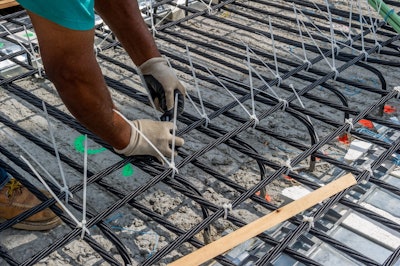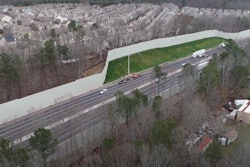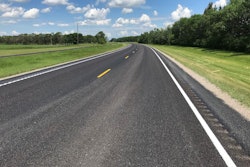 Carbon fiber strands being installed on the M-102 bridge deck in Wayne County. Photo credit: Michigan DOT
Carbon fiber strands being installed on the M-102 bridge deck in Wayne County. Photo credit: Michigan DOTCarbon fiber continues to grow in popularity as an alternative to steel-reinforced concrete bridges, and a recent report indicates the material can stand up to years of harsh weather.
Lawrence Technological University tested carbon fiber reinforced polymer components for four years to determine how well they would endure the Michigan’s harsh weather and other conditions. The ensuing report for the Michigan Department of Transportation was named one of the top 16 research projects in 2020 by the Research Advisory Committee at the American Association of State Highway and Transportation Officials.
“Investigators found that CFRP strands held up well to conditions that simulated Michigan’s harsh weather,” says an MDOT news release. “Moisture, rain, freezing rain and extreme temperature swings did not significantly affect the material’s strength or mechanical properties over time. In addition, test results showed that some currently accepted parameters for CFRP are conservative and can be updated.”
The report indicates that the guaranteed tensile strength for CFRP recommended by the manufacturer can be significantly increased for design purposes.
The researchers put CFRP strands through 300 freeze-thaw cycles, fire events and other trials. “Now, bridge designers have the information and specifications they need to predict how CFRP will perform under a variety of real-world conditions, as well as the design tools for future bridge projects,” MDOT says.
CFRP is viewed as an alternative to steel-reinforced concrete, which can corrode over time from the elements and lead to costly repairs. MDOT says carbon fiber strands resist corrosion, last longer and require less maintenance.
“Since CFRP is non-corrosive, we are eliminating the potential of concrete deterioration from steel corrosion, which is the major cause of shorter service lives on bridges,” says Matthew Chynoweth, MDOT chief bridge engineer and director of MDOT’s Bureau of Bridges and Structures. MDOT has a goal of achieving a 100-year bridge life. MDOT and Lawrence Tech have been studying CFRP since 1988.
MDOT reports that since its first use in 2001 – for the country’s first three-span CFRP pre-stressed concrete bridge, built in Southfield – more than a dozen bridges in the state have CFRP pre-stressing and post-tensioning. Those include Detroit’s southbound I-75 bridge that has 140-foot-long CFRP pre-stressed beams, and two bridges for a revamped I-94.
One of the drawbacks is that CFRP costs more, so MDOT says it can only do a few bridges a year with the composite material. However, the agency’s carbon fiber composite cable supplier, Tokyo Rope, has built a fabrication facility in Michigan, which has cut some costs and delivery times, Chynoweth says.












